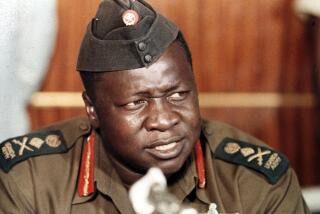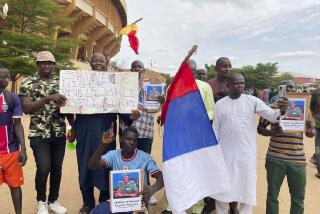An African Tradition Holds the Key
- Share via
WASHINGTON — Rare is the demise of an African head of state greeted with open and euphoric jubilation. But such was the response among pro-democracy activists when Nigeria’s military despot, Gen. Sani Abacha, unexpectedly died of a heart attack. Widely loathed for his brutal tactics, Abacha followed the trail of once-distinguished African generals who met ignominious ends: Samuel K. Doe of Liberia, Juvenal Habyarimana of Rwanda, Mohamed Siad Barre of Somalia and Mobutu Sese Seko of former Zaire.
Under Abacha, Nigeria was headed toward a Rwanda-like meltdown. Since December 1996, the number of bombings had been mounting, the latest in April, just before the legislative elections. In late February, a letter signed by 18 prominent northern politicians from Abacha’s own ethnic support base had urged him to step aside. Former military rulers also joined the chorus pleading for his resignation. But he adamantly refused, sending shivers through Nigeria’s neighbors.
Nigeria, with its natural resources, should have been the “giant of Africa.” But 31 years of misrule and plunder by incompetent military vagabonds have reduced the nation to a comatose midget. Basic social infrastructure has collapsed. Nigeria’s university system is a shambles. Health care is nonexistent. The country’s four oil refineries have broken down, and the funds intended for their repair stolen. As a result, Nigeria, a major oil-producing country, cannot supply gasoline to its own people.
Transparency International, a private watchdog group based in Berlin, ranks Nigeria as the most corrupt nation in the world. In 1985, novelist Chinua Achebe wrote: “The trouble with Nigeria is simply and squarely a failure of [military] leadership. There is nothing basically wrong with the Nigerian character. There is nothing wrong with the Nigerian land or climate or water or air or anything else.”
Nigeria’s transition to democratic rule, started by former military dictator Gen. Ibrahim Babangida in 1985, was marked by frequent interruptions, devious maneuvers and broken promises. For eight years, Babangida went through political contortions to impede progress, reneging on four occasions to return the country to civilian rule. Finally, he annulled the June 12, 1993, presidential election.
Babangida’s charade was immediately followed by Abacha’s “419 transition,” replete with suffocating chicanery, manipulation and acrobatics. As the absolute ruler of Nigeria, he brooked no dissent. All seemingly democratic institutions were systematically demolished and repression reigned. Newspapers were routinely shut down, editors and journalists arrested. Human rights activists fared much worse. Even diplomats were not spared from the lashing and intimidation. In September 1997, for example, a reception in honor of departing U.S. Ambassador Walter Carrington was broken up by security agents.
In 1995, Abacha set up a constitutional conference to prepare Nigeria for a transition to democratic rule. But 33% of the delegates were his appointees and, on top of that, he reserved for himself the right to accept or reject the recommendations of the conference. This year, he permitted the formation of five political parties, all of which promptly chose him as their presidential candidate for the proposed August elections. The constitutional conference did produce a constitution to guide these elections, but it was kept secret from the public while being constantly amended.
Though Abacha’s death may produce a collective sigh of relief, Nigeria, as well as the West African region, are not out of the woods yet. The new head of state, Maj. Gen. Abdulsalam Abubakar, the chief of the defense staff and former No. 3 man in the Abacha junta (the No. 2, Oladipo Diya, is in jail on coup-plot charges), shoulders a monumental task of returning the country to democratic rule. Tension remains high in the country and a power struggle could erupt within the army if he dithers. The transition program started by Abacha is too discredited to be continued. To demonstrate his sincerity, he must release political detainees, including chief Moshood Abiola, whose victory in the ’93 election was annulled, and former head of state Gen. Olusegun Obasanjo.
But a solution to Nigeria’s political crisis may lie next door in Benin, which made a peaceful transition from military dictatorship to democratic rule. Benin followed an indigenous African tradition: When a crisis erupts in an African village, the chief and the elders would call a village meeting. The issue was debated by the people until a consensus was reached. Once a decision was taken, all, including the chief, was required to abide by it. In recent years, this indigenous African tradition was revived by pro-democracy forces and reconfigured into a “sovereign national conference,” which was used to chart a new political future for Benin, Zambia and South Africa, among others.
A sovereign national conference must satisfy three criteria: It must allow open and fair representation of groups and not be packed with pro-government groups; it must operate without fear or intimidation from security forces to set up an interim constitution, a transitional administration and a timetable for elections, and its decisions must be binding on all, including the head of state.
Benin’s nine-day national conference began Feb. 19, 1990, with 488 delegates, representing various political, religious, trade unions and other groups encompassing a broad spectrum of Beninois society. The conference held “sovereign power” and its decisions were binding on all, including the government. It stripped President Mathieu Kerekou of power, scheduled multiparty elections and ended 17 years of autocratic Marxist rule.
In South Africa, the vehicle used to make its difficult but peaceful transition to a multiracial democratic society was the Convention for a Democratic South Africa. It began deliberations in July 1991, with 228 delegates drawn from about 25 political parties and various antiapartheid groups. The convention strove to reach a “working consensus” on an interim constitution and set a date for the March 1994 elections. It also determined the composition of an interim or transitional government that would rule until the elections were held. More important, the convention was “sovereign” and its decisions were binding upon the De Klerk government.
Abacha’s death presents an opportunity for Nigeria’s rambunctious pro-democracy groups to evoke African tradition to achieve their goal. Hopelessly fragmented and incessantly quarreling, they have yet to articulate a better vision for the country. If a tiny neighbor, Benin, can make a peaceful transition to democratic rule, the “giant of Africa” should do better.
More to Read
Sign up for Essential California
The most important California stories and recommendations in your inbox every morning.
You may occasionally receive promotional content from the Los Angeles Times.













